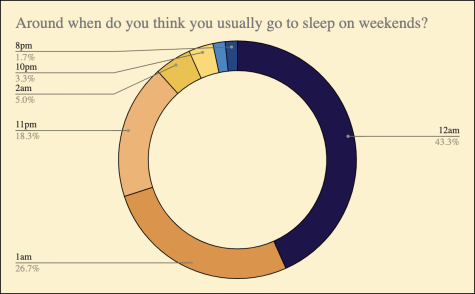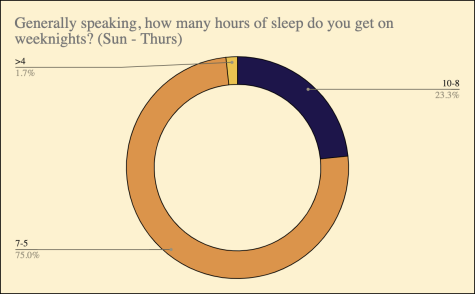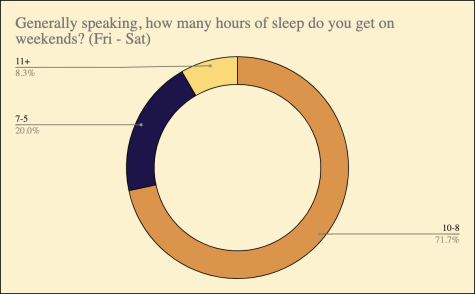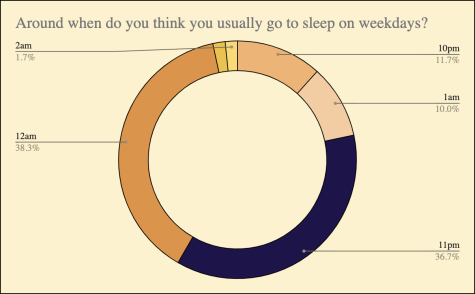Catching the z’s: the sleeping habits of Urban students




The return to in-person school in March 2021 was an energizing triumph over COVID-19, but in many ways, exhausting. Constant socialization, extracurriculars, and homework can be overwhelming for many only in the past one and a half years. When it comes to rest, the American Academy of Sleep Medicine (AASM) and the American Sleep Foundation (ASF) both recommend that adolescents between the ages of 13-18 sleep for 8 to 10 hours in order to gain sufficient respite for the next day.
“For teens,” says the AASM, ”profound mental, physical, social, and emotional development requires quality sleep,” Contrary to these recommendations, in a random survey of 60 people conducted by the Urban Legend, 76.7% of the Urban student body attested to having inadequate sleep time (seven hours or less) on the weekdays. Mia Fessel ‘25 said, “[when I am deprived of sleep,] my concentration levels are way down.” She also mentioned that usually the nights she loses sleep are frequently the nights before two double periods, making it harder for her to concentrate in class.
Moreover, the social aspect of school can further contribute to fatigue in students. “Going through a full day of school [is] already a lot of energy and a lot of strength to even be outside interacting with people,” said Selena Corpuz ‘24, “And then at home, I’d be so drained mentally and physically because I don’t sleep.”
Although students have said it is tough to get enough sleep, Daisy Merritt ‘24 testifies to the flexibility of the Urban Faculty in order to accommodate students. “I think the teachers genuinely care about my sleep schedule,” said Merritt.“They’re very lenient with giving extensions and I think that can be really helpful if you’re honestly telling them, ‘I’m at the end of my limit. I can’t do this. I don’t have the time.’ They’re going to say that they understand.”
In this same survey, 76.7% of Urban students mentioned that homework was a primary factor in altering their sleep schedule. To help students go to sleep at a reasonable time, page 19 of Urban’s online handbook states that students in grades 9 and 10 should have approximately “30-45 minutes [of homework per] class meeting,” while students in grades 11 and 12, and UAS classes, should expect “45-60 minutes [of homework per] class meeting.”
Teague Millette ‘22 said, “My biggest piece of advice is to have a cut-off time where you’re going to bed, everything else be damned.” While students’ ability to get their work done may vary in terms of subject or when they get to their homework, the homework time maximums are supposed to serve a similar function to Millet’s “cut-off.”, and is intended to keep students mentally healthy.
Additionally, the survey said 41.67% of students mentioned sports or another extracurricular activity dictating their sleep. Most Urban sports teams practice 5 days a week, and extracurriculars can be from a day a week to every day depending on the students’ commitment to the activity. “With advanced classes and a sport, it’s pretty much impossible to get enough sleep. There’s just too much to do. It’s not by choice.” said Ryan Steinbach ‘22.
“I think limiting the amount of homework is good, but I feel like maybe something else is just to emphasize to people at school that it’s okay to sometimes take breaks,” said Merritt. “I feel like a culture gets created where we feel like we have to stay up really late to get it done, but if we were being told that sometimes it’s okay to not do that, maybe people would make that decision less and feel less stressed about having to cram it all in at the end.”

